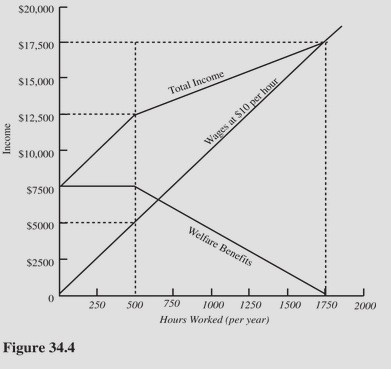An explicit cost is defined as
A) a cost that does not change as output changes.
B) a nonmonetary opportunity cost.
C) a cost that involves spending money.
D) a nonmonetary accounting cost.
Answer: C
Economics
You might also like to view...
Even if demand for a resource grows over time, ever-rising prices of the resource that result from its growing scarcity still discourage consumption.
Answer the following statement true (T) or false (F)
Economics
 Refer to Figure 34.4. There is a welfare-induced disincentive to work starting at
Refer to Figure 34.4. There is a welfare-induced disincentive to work starting at
A. 750 hours. B. 17,50 hours. C. 500 hours. D. 1250 hours.
Economics